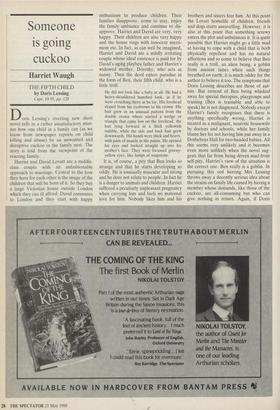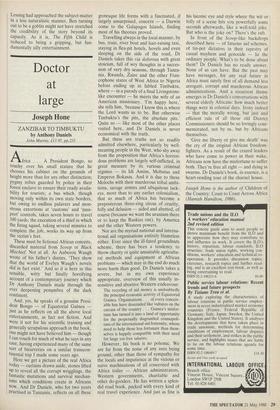Someone is going cuckoo
Harriet Waugh
THE FIFTH CHILD by Doris Lessing
Cape, £9.95, pp. 128
Doris Lessing's rivetting new short novel tells in a rather unsatisfactory man- ner how one child in a family can (as we know from newspaper reports on child killing and abuse) be an unwanted and disruptive cuckoo in the family nest. The story is told from the viewpoint of the reacting family.
Harriet and David Lovatt are a middle- class couple with an unfashionable approach to marriage. Central to the love they have for each other is the image of the children that will be born of it. So they buy a large Victorian house outside London which they can ill afford. David commutes to London and they start with happy enthusiasm to produce children. Their families disapprove, come to stay, enjoy the family ambiance and continue to dis- approve. Harriet and David are very, very happy. Their children are also very happy and the house rings with innocent merri- ment etc. In fact, as can well be imagined, Harriet and David are a mildly irritating couple whose ideal existence is paid for by David's aging playboy father and Harriet's widowed mother, Dorothy, who acts as nanny. Then the devil enters paradise in the form of Ben, their fifth child, who is a little troll.
He did not look like a baby at all. He had a heavy-shouldered hunched look, as if he were crouching there as he lay. His forehead sloped from his eyebrows to his crown. His hair grew in an unusual pattern from the double crown where started a wedge or triangle that came low on the forehead, the hair lying forward in a thick yellowish stubble, while the side and back hair grew downwards. His hands were thick and heavy, with pads of muscle in the palms. He opened his eyes and looked straight up into his mother's face. They were focussed greeny- yellow eyes, like lumps of soapstone.
It is, of course, a pity that Ben looks so strange and that he starts developing so oddly. He is unusually muscular and strong and he does not relate to people. In fact he is a danger to animals and children. Harriet suffered a peculiarly unpleasant pregnancy when carrying him and feels no maternal love for him. Nobody likes him and his brothers and sisters fear him. At this point the Lovatt homelife of children, friends and dogs starts unravelling. However, it is also at this point that something screwy enters the plot and unbalances it. It is quite possible that Harriet might go a little mad at having to cope with a child that is both physically repellent and has no natural affections and so come to believe that Ben really is a troll, an alien being, a goblin from ancient times when such things breathed on earth; it is much odder for the author to believe it too. The symptoms that Doris Lessing describes are those of aut- ism. But instead of Ben being whisked away for special therapies, playgroups and training (Ben is trainable and able to speak) he is not diagnosed. Nobody except Harriet's family recognises that there is anything specifically wrong. Harriet is treated as a malignant, neurotic housewife by doctors and schools, while her family blame her for not having him put away in a Dotheboys Hall for two-headed babies. All this seems very unlikely and it becomes even more unlikely when the novel sug- gests that far from being driven mad from self-pity, Harriet's view of the situation is the correct one. Ben really is a goblin. In pursuing this red herring Mrs Lessing throws away a decently serious idea about the strains on family life caused by having a member whose demands, like those of the cuckoo, are all-consuming but who can give nothing in return. Again, if Doris
Lessing had approached the subject-matter in a less naturalistic manner, Ben turning out to be a goblin might not have stretched the credibility of the story beyond its capacity. As it is, The Fifth Child is reduced to being a gripping, but fun- damentally silly entertainment.































































 Previous page
Previous page